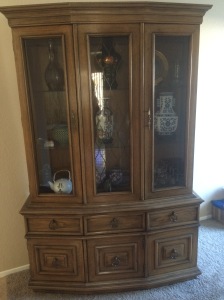How did I start doing this kind of work? Sometimes the way we travel is straight forward, but usually it is circuitous. I most recently (before being kidnapped into my current profession) worked for ten years as a manager for a major bookstore chain, but prior to that I owned my own bookstore, and prior to that I got my university degree in English with a minor in Writing. A pretty straightforward path so far (except for my previous years as a psychiatric technician in a state hospital). So, how did I end up as an estate sale professional? As I said, the route was circuitous. My grandmother was born in 1899 of good, thrifty farm stock from Kentucky. She was neat and orderly, but she saved and used everything possible. She once gave me the sage advice to never turn down anything someone might offer me, because if I do, they may never offer anything again. My father was born at the beginning of the Great Depression, so I’m sure he absorbed my grandmother’s thriftiness while still in the womb. Even my mother learned the hard way that thrift could save one’s life when she and her family fled Oklahoma during the the Dust Bowl Days, only to find work hard to come by in the Great Central Valley of California. Thrift is in my blood, too. It’s hard for me to pass up a bargain or to throw useful items out, but I have also learned the dangers of holding on to too much. My father turned his gift for thrift into an obsession for possessions. And not always the good kind of possessions. While my mother lived, she limited my father’s growing masses to his garage, where he kept his old car parts and tools, his dressers and tables, his oxen yoke and his plain old junk. When she died, the mass grew until it consumed the house. Every weekend found him scouring garage sales and estate sales looking for treasures. When we, his children, tried to convince him that his treasures were overwhelming his life and we tried to talk him into letting us help him get rid of some of it, even just a little at a time, he would get angry. When he died, from the growing mass of cancer that was consuming his body, we mourned and began the task of clearing his house. He had indeed amassed some treasures, but for every precious thing we found, we uncovered five that were not worth saving. Some precious things had been destroyed by the weight of worthless things that covered them. He had saved his treasures as a shield against poverty, or so he said, but in the end his possessions had not added to his life in any good way, and they had limited his life in more ways than just their infringements on his living space.
My father, though, is not the only reason I started doing estate sales. My daughter is the temptress who led me astray. Sometimes a gene will loose some of its power with one generation only to spring full force in the next. My own sweet daughter has the thrift curse. Fortunately for her, she also inherited my brains and beauty. At nineteen, she opened her own thrift store. From that beginning, she started investing in antiques and collectibles, placing them in a succession of stores, until finally she discovered the wonders of estate sales. She was already a knowledgeable professional by the time my father died. It was she who held the estate sale in my father’s house, she who organized and priced the masses of treasures from his collections. She had started tempting me slowly, convincing me to come work a day for her here and there. Soon, I was as addicted as she was. Then, clever girl, she started asking me to handle more and more of the estate sale business until she had me firmly wearing the yoke. That’s when she started to pull out. She opened her first vintage clothing store, then moved to a larger space, then opened a second store. I was left in the estate sale yoke, thankfully happy with my lot of pulling the business forward. Kris is still my go-to expert, though now I hope I’ve gained considerable knowledge on my own. I increased my knowledge by attending the College for Appraisers in Whittier and by reading copiously on the subject, but I know there is still much to be learned. Always.
Most of us don’t grow up thinking: “Gee, I think I’ll be an estate sale professional!” I know I didn’t. However, I find that this business combines many aspects that I find fascinating: people, treasure hunts, peeking into people’s private lives and learning their stories. It has also taught me many lessons: don’t hold on to things you truly don’t want others to find, organize your stuff so your heirs don’t have to suffer to find your treasures, but don’t throw or give your stuff away just because you think nobody would want it. They will, or they will sell it for good money.
It’s a good business to be in. It can be very rewarding, both monetarily and emotionally, but it is also hard work that is often dirty and occasionally unprofitable. Ignore what you see on TV about this business; most of it is either outright lies or dramatized to make it look more exciting than it really is. To do this work, in my opinion, you should have a strong sense of honor and professionalism, a stronger stomach, sharp eyes and a good brain. The ability to empathize goes far, too. People are an important aspect of this work; if you dislike people in their many forms and moods, you will grow to hate this work. I’m sure there is more that I’ve forgotten to include. I welcome comments, but that’s enough from me for today.












